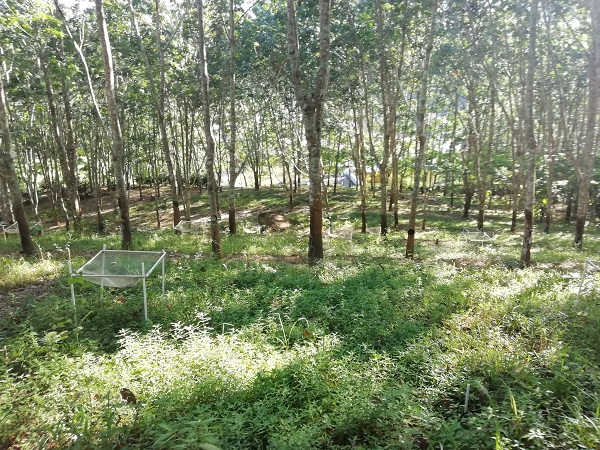The conversion of tropical rainforests to rubber plantations has brought significant adverse effects to the ecological environment. Rubber-based agroforestry systems are a preferable approach for making the ecological environment better in rubber planting areas. Previous studies have focused on the positive effects of rubber-based agroforestry systems on the ecological environment. However, the risks involved in the establishment of rubber-based agroforestry systems have been ignored.
In a study published in Journal of Environmental Management, researchers from Xishuangbanna Tropical Botanical Garden (XTBG) investigated the effects of different-aged rubber-based agroforestry systems on the abundance and diversity of ground arthropods. They further wanted to elucidate the main factors affecting the diversity and abundance of ground arthropods in rubber and rubber-based systems.
They found that number of understory vegetation species significantly decreased as the trees in the rubber plantations aged. The decline in understory vegetation species caused the decrease of abundance and taxon richness of ground arthropods compared to the rubber monoculture plantations.
They further found that understory vegetation species and soil temperature were the main factors affecting the diversity and abundance of ground arthropods in rubber and rubber-based systems.
“Therefore, the establishment of rubber-based agroforestry systems reduced the diversity and abundance of ground arthropods,” said Dr. LIU Changan, first author of the study.
“When establishing environmentally friendly rubber-based agroforestry systems, single, large rubber-based agroforestry systems are not recommended and the problem of decrease of the abundance and richness of ground arthropods should be solved,” said LIU.
Contact
LIU Changan Ph.D
Key Laboratory of Tropical Plant Resources and Sustainable Use, Xishuangbanna Tropical Botanical Garden, Chinese Academy of Sciences, Menglun 666303, Yunnan, China
E-mail: liuchangan@xtbg.ac.cn

Rubber-based agroforestry in Xishuangbanna (Image by LIU Changan)

